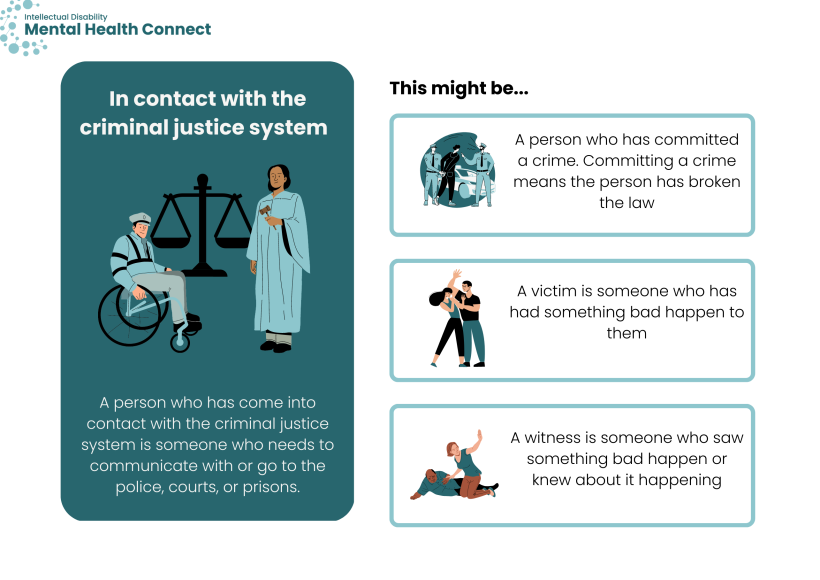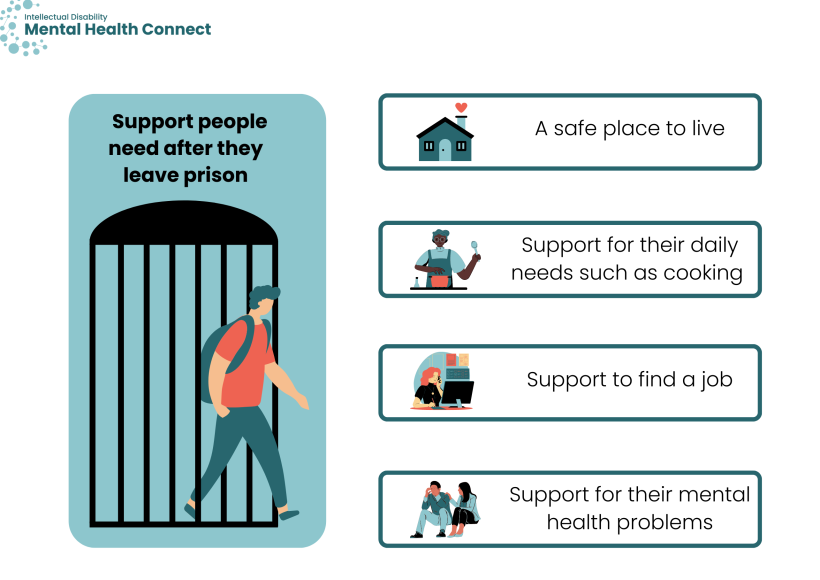People in contact with the justice system
Jump to a section below
Introduction
A person who has come into contact with the criminal justice system is someone who needs to communicate with or go to the police, courts, or prisons.
- The courts are where people decide if someone has broken the law. Laws are a set of rules that everyone must follow.
- Prisons are places where some people stay if they have broken the law.
This does not always mean that the person has committed a crime. Committing a crime means the person has broken the law.
A person can come into contact with the criminal justice system because they are a victim or a witness.
- A victim is someone that has had something bad happen to them.
- A witness is someone who saw something bad happen or knew about it happening.

People with intellectual disability and the criminal justice system
People with intellectual disability can have trouble understanding the criminal justice system. This means they may be more likely to go to prison if they have committed a crime. They are also more likely to be ignored if they have been a victim of a crime.
Sometimes, people do not know that someone has an intellectual disability when they come into contact with the criminal justice system. This means that it can be hard for the person’s needs to be met. For example if the police do not know that the person has intellectual disability, they will not be able to have a support person with them at the police station.
People with intellectual disability may also have difficulty after they leave prison. They may not have the support they need, including:
- a safe place to live
- support for their daily needs such as cooking and cleaning
- support to find a job
- support for their mental health problems.

There is support that can help people with intellectual disability and mental health problems so that they can feel well and be part of their community. Having the right supports means that the person will be less likely to commit another crime.
Concerns you may face when getting help for your mental health and what you can do
You may not understand the criminal justice system
It can be difficult for everyone to understand the criminal justice system. If you have trouble understanding what might happen next or need help with telling your story to police or the court, you can:
- tell the police or the court how you want them to communicate with you. You can tell them if you do not understand
- look for a justice advocate through the Justice Advocacy Service. An advocate is someone who speaks up to get you the support you need. The Justice Advocacy Service is free and can send someone to be your support person. The support person can help you to:
- know what to expect
- fill in forms
- understand how you should be treated
- stay calm
- understand what has happened and what will happen next.
You are worried that people will treat you in a different way because you have intellectual disability
You may want to hide your intellectual disability because you are worried that you will be treated differently. But it is important that people working in the criminal justice system know you have intellectual disability so that you can get the support you need.
- You can also get a justice advocate through the Justice Advocacy Service to support you. The Justice Advocacy Service is free. The advocate can make sure that your needs are being met.
You need help after leaving prison
It can be hard to be back in the community after leaving prison. You may feel like you do not have enough support. There may be different services and programs that you have to go to, and it can be hard to manage.
There are services and supports to help you prepare to leave prison.
- Corrective Services NSW has case managers for people in prison. These case managers can help make a plan for when you are in prison and after you leave prison. Health workers who support you after you leave prison can follow the plan so that the care you got in prison continues after you leave prison.
Other things you can do if you need help include:
- asking your support workers to help you to manage your appointments. For example, they can help you get the transport you need to go to your appointments
- seeking help if you have concerns about your mental health. This includes if you are worried about the way you use drugs or drink alcohol. For more information visit Where to start to get help
- getting advice or help from organisations like the Community Restorative Centre. The Community Restorative Centre has programs and services that can help people who have left prison
- communicating with someone you trust. Someone you trust may be a family member, carer, support worker, or doctor.
Services and supports
- The Justice Advocacy Service is free. You can get an advocate or support person from the Justice Advocacy Service to support you. People who work at the Justice Advocacy Service know how to work with people with intellectual disability. They can help you to:
- know what to expect
- fill in forms
- understand how you should be treated
- stay calm
- understand what has happened or what will happen next.
- The Community Restorative Centre has a free telephone information and referral service. You can call their telephone service on (02) 9288 8700 between 9am and 5pm on Monday to Friday. They also have services and programs that help people who have left prison.